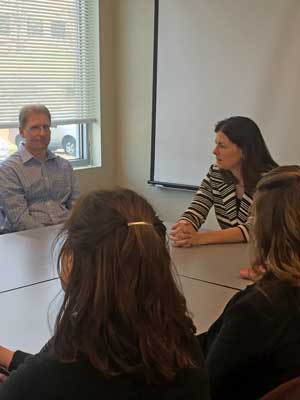
Sen. Kelly Ayotte meets with seven breast cancer survivors who were diagnosed in their early 40s, plus radiologist William M. Sherman, Jr. to discuss her PALS Act legislation.
Several national insurance carriers have already reduced coverage of annual screening mammograms for thousands of women in New Hampshire by not paying for 3D mammography. However, Derry Imaging Center considers 3D mammography the standard of care, and will not pass along any extra costs to its patients for annual breast mammogram screenings.
“We feel strongly that 3D mammography is the standard of care, offering the most advanced clinically proven technology available today,” says Heidi Clark, director of Derry Imaging. “Our comprehensive 3D mammography system enables us to provide the highest resolution and fastest results for annual screenings and diagnostic mammograms.”
Derry Imaging follows the guidelines of the American College of Radiology and Society of Breast Imaging which recommends women 40 and older have a mammogram every year so that all of its patients have access to this latest advancement.
Senator Kelly Ayotte (R-NH) has had several of her constituents tell her that early detection of breast cancer saved their lives. That is what prompted her to come to Derry Imaging last week and meet with seven breast cancer survivors who were all diagnosed with breast cancer in their early 40s. Without the screening, and in particular without the higher resolution of 3D mammography, their cancers would not have been caught as early as they were, and their chances of survival would be lessened.
The recent, controversial recommendation by U.S. Preventive Services Task Force (USPSTF) threatens access for women under 50 to mammograms that play an important role in the early detection of breast cancer. The proposed changes to national guidelines would limit access to mammography for 22 million women between the ages of 40-49, and then only recommend screenings every other year after age 50.
“We need to ensure that women have the best information available to make well-informed health care decisions,” said Senator Ayotte. She and Barbara Mikulski have co-sponsored the Protect Access to Lifesaving Screenings (PALS) Act (S. 1926) to protect access to annual mammogram screenings for women ages 40 to 74. The PALS Act would create a two-year moratorium on the Task Force’s recommendations. It is important to note that the Task Force did not include any experts in medicine, radiology, or oncology, and based their recommendations on outdated European 2D mammography studies.
The bi-partisan PALS Act is supported by many organizations, including: American College of OB/GYNs, American College of Radiology, Susan G. Komen, Society for Breast Imaging, and many others.
Derry Imaging radiologists William M. Sherman, Jr., MD and Michael DeLeo, III, MD also emphasized the importance of annual mammogram screenings for women starting at age 40, regardless of family history. “The standard of care being taught in radiology programs is for annual 3D mammography,” said Dr. DeLeo, a Women’s Imaging Fellow with concentration in breast and oncologic imaging.
“Women’s access to free preventive mammograms must not be impeded, discouraged or eliminated,” said Senator Ayotte. “Too many women and their families are getting mixed messages about when and how often to get mammograms. This has serious implications for women’s health as well as families’ economic well-being if insurers limit coverage.”
